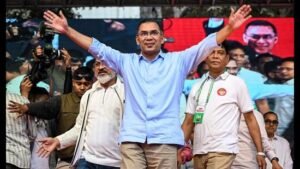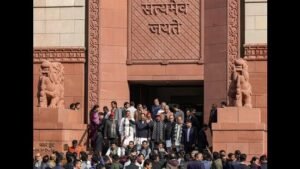
On October 11, 1902, in the Dharm, sanskrit and land of knowledge of Bihar, at the confluence of the Ganga and the Ghaghra in the village of Sitabdiara, was born the champion of democracy, Lok Nayak Jayaprakash Narayan. Today, we commemorate his 123rd birth anniversary. Fondly remembered as JP, the architect of Sampoorna Kranti (Total Revolution), was a statesman, who never thought about himself, but always placed the concerns of the poor as his topmost priority. The title Lok Nayak was bestowed on him by no great personality, but by the loving masses who had assembled at Patna’s Gandhi Maidan on June 5, 1974. On this day, I pay my naman (salutations) to this great leader.

JP’s humble beginnings from Sitabdiara helped him stay rooted and always concerned about the problems beleaguering the poor. After completing his primary education from Sitabdiara, he shifted to Patna. The scholarly and nationalist atmosphere in the city sowed the seeds of nationalism in him. During his intermediate education, the Non-cooperation Movement against the British was sweeping through India. It left a deep impact on him: He shunned all luxuries and adopted Swadeshi,
During his seven years as a student in the US, JP was attracted towards Marxism, which he thought offered the solution for all of India’s problems. However, upon his return to India and after exploring the feasibility of customizing the philosophy of Marxism to the Indian scenario, he realized that democratic socialism and Sarvodaya were better suited to address the problems of India. This practical approach bears witness to JP’s wisdom and statesmanship. It reveals that he was not merely a follower of ideologies but a leader seeking change and transformation in society.
In 1952, he thought Vinoba Bhave’s Bhoodan movement combined with the philosophy of Sarvodaya could address the land question in India. His initiatives during 1954–1973, such as the resettlement of the dacoits of Chambal, and the formulation of a non-violent Total Revolution have been acknowledged and recognized worldwide. He constantly yearned to achieve the goals of freedom, equality, brotherhood and peace for the whole of mankind.
Jayaprakashji’s understanding of the concept of the dignity of labor was not theoretical, but stemmed from his own personal experiences. During his student years in the US, he had to support himself financially doing several odd jobs. These experiences gave him insights into the issues concerning the working class, which helped him strengthen his belief that honest labor deserved respect, fair wages, and humane working conditions. He observed that while industrial societies enjoyed prosperity, the working class often lived in poverty. When he returned to India, he carried with him a strong conviction that the foundation of a just society must rest on the welfare of the working class. Significantly, in 1947, he was chosen the president of three important all-India labor organizations, namely, the All-India Railwaymen’s Federation, the All India Postmen and Telegraph Lower Grade Staff Union, and the All India Ordnance Factories Workers Union.
Jayaprakashji’s journey did not end with the freedom movement. He was not attracted to public office, but yearned to do my own (service) for the people. In the 1960s, Bihar experienced a terrible famine. Jayaprakashji, along with his associates and followers from the Bhoodan movement, engaged in relief work to alleviate people’s sufferings. During this association with the relief work of Bihar Rahat Committee, he had firsthand experience of the service-to-the-nation approach of the RSS. volunteersHe was deeply moved.
When he encountered corruption in all walks of life, Jayaprakashji felt the need to inspire the youth of the nation to usher in the revival and reconstruction of Indian society. In 1973, when people started losing faith in the institutions of democracy, he restored their hope and faith by calling for Total Revolution from the Paunar Ashram of Vinoba Bhave. The ultimate goal of the Total Revolution movement was to achieve a humanist version of an ideal society. His relentless campaign against the corruption entrenched in the politics of those days was instrumental in establishing the power of people in democracy. He galvanized the masses and channelised their anger into the establishment of a new order in India in 1977. He demonstrated that democracy is not about ruling the people, but about being the voice of the masses.
As a 19-year old, it was an honor and great privilege for me to contribute to the Sampoorna Kranti movement as its district organizing secretary in Coimbatore. My learnings during this phase, a crucial juncture in the history of India, helped my transformation into a confident and socially aware leader. The movement nurtured within me essential traits of leadership — maturity, ethical judgment, and civic consciousness.
As we fondly remember our beloved Jayaprakashji, let us not fail to acknowledge the unfailing support of his spouse, Prabhavati Devi, who had made a vow of celibacy as an act of selflessness. towards the cause of the freedom movement. She channelised and dedicated her energy towards selfless pursuit of the ideals of Gandhiji.
From the Quit India movement of 1942 to Total Revolution in the 1970s, the one constant factor that kept him going was his love for the nation. Even though he had the opportunity to seek any post of his choice in the government, he never yielded to the lure of office but remained committed to selfless service to the nation. His feeling of sacrifice for the uplift of the poor and the downtrodden is unsurpassable.
Jayaprakashji’s life and teachings are a testament to the power of people to bring about change, no matter how insurmountable the challenges appear. His teachings place emphasis on defending democratic values and working towards a society where equality, justice, and peace prevail. He was a visionary leader, who refused to separate political freedom from social and economic justice. His teachings continue to inspire not just politicians but every Indian citizen who believes in the ideals of democracy, liberty, and equality.
The idea of revolution is often synonymous with violence. But Jayaprakashji’s concept of Total Revolution was based on non-violence. Through a non-violent people’s movement, he was able to lay the foundation of a Bharat that would uphold the values of humanism and ethics.
As we fondly remember and pay our tributes to this great leader, we should pledge to remain vigilant custodians of the democracy that he helped to defend.
Our true act of homage on this day will be to awaken our conscience and work towards the betterment of Bharat with selflessness, service, and truth. For all his contributions towards nation-building, he was awarded the Bharat Ratna, which I believe, was too little for this great man.
CP Radhakrishnan is Vice-President of India.




